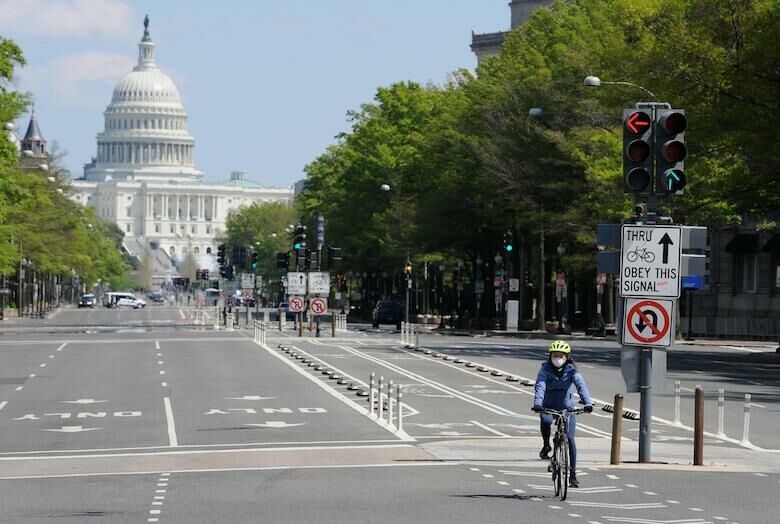
The COVID-19 health crisis is doing a number on D.C.’s finances, Mayor Muriel Bowser’s administration said on Friday afternoon.
In a briefing at the Department of Human Services building, Chief Financial Officer Jeffrey DeWitt released revenue projections that predict that the District will have a $721.8 million hole in the budget that must be balanced by the end of the fiscal year Sept. 30.
His report also predicted that revenues for fiscal year 2021, which begins Oct. 1 of this year, will be about $773 million less than expected. That’s a hole that Bowser’s administration will have to fill in the 2021 budget, which Bowser said her administration is working on now.
The numbers assume that some businesses will be allowed to reopen in the summer with social distancing and other restrictions in place, that recovery will begin in the summer, and that the new “normal” will begin in the spring of 2021.
“You can’t just turn a business switch back on,” DeWitt said.
- Sign up for news alerts from WTOP
- Maryland Gov. Hogan unveils coronavirus recovery plan
- ‘Science-based’ plan to reopen states proposed in Congress
- ‘We will be here to support you’: DC psychologists offer assurance
- Iconic DC sites have changed due to the pandemic
- Latest coronavirus test results in DC, Maryland and Virginia
- Coronavirus resources: Get and give help in DC, Maryland and Virginia
DeWitt said officials expected a “U-shaped recovery” as opposed to the quick “V-shaped” recovery, or the fits and starts of a “W-shaped” recovery. He also projected that the stock market would not seriously rebound until next year.
Between the hotel and restaurant industry and retail stores, 56% of the District’s sales tax has “essentially shut down,” DeWitt said, and increased online sales aren’t making up for it.
The jobs picture looks grim as well: While employment was supposed to grow 1.1%, it will in fact go down 5.1%, and that 93,000 jobs, mostly in hospitality, will be lost by July.
Overall, the District will lose about $3.2 billion in revenue until the end of the 2024 budget year.
DeWitt saw revenue growing slowly, but only heading back to previous levels.
The economic problems of the first half of 2020 will ripple out for years, DeWitt said: Sales taxes are plummeting now; the drop in the stock market will affect income taxes for 2021, and the virus-driven economic crisis will drive down property values, which will affect the amount of property tax taken in for 2022.
The first couple of years of the rebound will be spent just getting back to where the District was before the virus hit: “By 2022, we’re back to 2019 levels,” DeWitt said.
“This is a recession, no matter how you look at it,” he added.
It could, however, have been worse, DeWitt said: “We ended the year with our reserves full,” and with $360 million extra. “The recovery will probably be better than in most places.”
Still, the outlook is grim, and the restaurant and hotel industry are leading the way.
DeWitt said about 40% of restaurants in the city are shut down, and about half will struggle to get back to normal. As for hotels, “We expect in the long run they’ll reopen, but it’ll take three to five years to get back to where they (were).”
His numbers assumed there would be no large events in the District until January 2021.
“As long as we manage it in a way that doesn’t cause a second shutdown, we think a U-shaped recovery is possible,” DeWitt said.
“As long as it’s not an L,” Bowser said.
Bowser said, one way or another, the budgets will be balanced. Asked whether the budget crunch would lead to layoffs or furloughs of city workers, the mayor said, “We are going to look very closely at all of our expenses” and that changes would be made in all agencies.
Referring to D.C. as one of the best cities in the nation to live, the mayor added, “We know that we got here [with] our employees, and we are going to make sure that the people who got us here will be with us for the recovery.”
At the same time, she said, “Everybody’s got to give something.”
As to whether taxes could be raised, Bowser said, “We have everything on the table. I know we can’t make up these deficits [solely] with tax increases.”
D.C. Council Chairman Phil Mendelson agreed: “I don’t think we can be taking anything off the table in terms of solutions.”
Council Member Kenyan McDuffie said in a statement after the meeting, “We are not alone among cities in the United States facing these challenges, but we are well-positioned compared to some of our counterparts. We entered this crisis with a full rainy day fund, a well-funded unemployment insurance fund and our employee pension obligations fully funded.”
On Friday night, Bowser requested an additional $63 million from the city’s contingency cash reserve for coronavirus response actions — $22.5 million to purchase medical equipment, personal protective gear and other supplies and equipment; and $40.5 million for staffing to provide increased medical services.
To date, Bowser has directed $192.4 million to the District’s COVID-19 response and recovery efforts.








